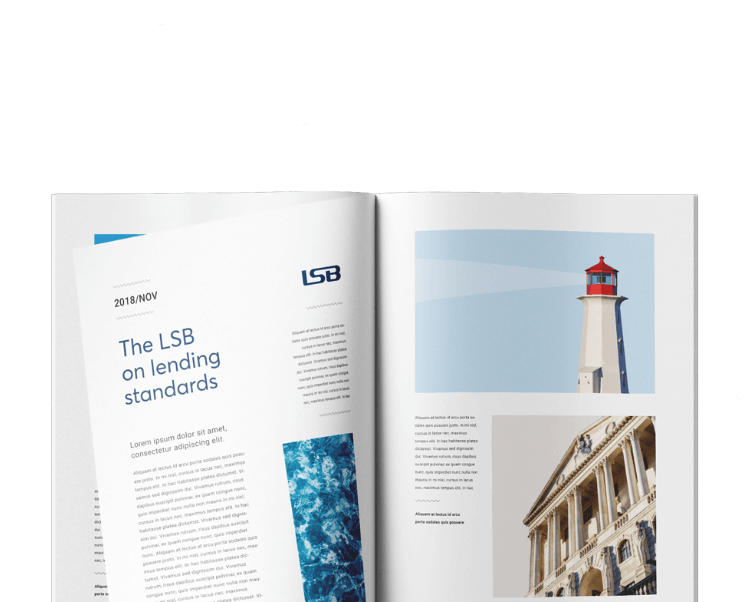Outgoing Chair Chris Pond shares his reflections on his time at the Lending Standards Board (LSB) and offers up some thoughts, and predictions, for the future.

What has been the most rewarding aspect of chairing the LSB?
Without a doubt, working with a fantastic group of people who are highly professional and very committed to what they’re doing. The LSB is a small organisation, but it’s growing, and punches well above its weight. It’s been very rewarding to see the extent to which both the size of the organisation and its reach has increased over the last few years.
…and the most challenging?
The wider landscape has been incredibly challenging over the past few years. We had the pandemic and now a cost-of-living crisis, which means that consumers and small businesses have been up against a lot and continue to be. They need access to affordable credit and trust that they will be treated fairly by the firms providing these services.
At the same time, banks, lenders and building societies are themselves under pressure. There are increasing demands for forbearance to treat people who find themselves in difficulty as generously as they can, whilst maintaining the balance of having a viable business.
Those registered with the LSB’s Standards and Codes have made a commitment to provide the best outcomes for their customers. As a self-regulatory body, we have the agility to update those best practice frameworks to reflect the landscape and provide registered firms with the tools they need to deliver fair outcomes no matter the circumstance. So, whilst the evolving landscape has been one of the most challenging aspects of my time here, seeing how quickly the LSB has been able to adapt has been one of the most rewarding things too.
Fraud has, unfortunately, continued to evolve over the last six years. What do you think isn’t being talked about enough on this front? Is there anything about the rise in scams that has particularly struck or surprised you?
It’s unfortunately not a surprise that there are scammers out there, prepared to take advantage of the tragedy of the pandemic, or the cost-of-living crisis, and to feed on people’s vulnerabilities.
Whilst the reimbursement work is extremely important, the real job is preventing this from happening in the first place, and that’s where the CRM Code is so important. We must find ways in which we can stop people going through the anxiety, and the life changing impact of losing substantial sums of money to scams.
Much of your career has been focused on financial inclusion. What have been the most important developments in this regard? And where do you think there is still room for improvement in the financial services sector?
I set up the Financial Inclusion Commission 10 years ago; an independent body, which works closely with the LSB and with other organisations across the political spectrum. What we have managed to do in that period is raise the issue of exclusion on the policy agenda. If you don’t have access to a bank account, it’s difficult to get a job or a home, and you’ll often pay more unless you can use direct debit. People who most need, for instance, home contents insurance because they live in high crime areas, are least likely to have that sort of protection. If you don’t have access to savings, when things go wrong, there is nothing to act as a cushion.
When people find themselves in those circumstances, they pay a heavy additional price. We hear about the cost-of-living crisis, but there’s also a poverty premium – those least able to afford certain services who end up paying more as a result. We must get the message across that there is a large section of the population who are in a very precarious situation, and, because we are a consumer driven economy, that means the economy is also in a precarious situation.
Excluding certain sectors of society means we miss out on the valuable contributions they would have made to the financial ecosystem and beyond. The LSB recently published a report on inclusion in business banking for disabled customers, ensuring that firms provide inclusive services for this vital community. We have also recently reviewed and updated the Standards of Lending Practice for personal customers to ensure inclusion is considered throughout the entire customer journey. There’s much more coming down the track in this space over the coming months too.
What other market pressures (other than the rise in fraud) are driving need for the LSB Standards and Codes?
In a wider sense, the move to digitisation. Increasingly, services are available digitally but not face-to-face. For large sections of the population that is going to prove challenging – we need to ensure that digital financial services are inclusive. The growth of the fintech sector presents an opportunity to make sure we raise standards across the board, but it’s also a threat: many of these new entrants, initially, will not be registered with regulators like the LSB. So, although they provide opportunities for customers, there are increased risks too.
That is why the LSB introduced an interim registration process allowing banks and lenders, no matter their size, to signal their commitment to good outcomes whilst working towards adherence of the Standards and Codes. Not only do the Standards set the bar high for customer protections, they incentivise and inform collaboration via the sharing of knowledge, expertise, and insights between regulators, traditional and challenger banks, and alternative lenders.
What does the future look like for the LSB? Do you think there are any current gaps in regulation where you can add value?
In short, yes. I’ve mentioned the fintech sector and there are also the challenger banks, not all of whom are registered. There also continues to be a significant rise in alternative lending, much of which is not covered by statutory regulation. By working towards best practice standards in the absence of regulation, lenders can ensure customers get the fairest deal.
The LSB will have to make sure that, as the nature of financial services changes, it can be as flexible as possible if it is to increase reach. As a self-regulatory body, we are in a unique position to be agile and act swiftly where protections are needed and where we can add value. It’s vital that policymakers and other stakeholders understand the need for the sort of voluntary regulation the LSB can provide.
My successor, Ken, is a very experienced chair and I am confident he will do a fantastic job at driving forward the LSB’s mission of producing the best outcomes for customers. The LSB will undoubtedly meet new challenges over time, but under Ken’s chairmanship I’m sure that we’ll continue to build on the very successful foundations we already have, to reach out to those sectors of financial services where there is no regulation or where greater protections can be afforded to both personal and business customers.









